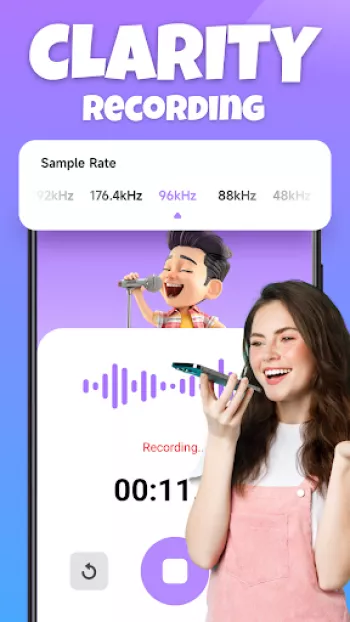Apps Home

The Technological Foundation Behind Voice Effects Transformation
Voice-changing technology has undergone remarkable evolution over the years, transforming from rudimentary pitch and speed adjustments to a sophisticated system capable of creating detailed and realistic audio modifications. At the heart of this transformation is digital signal processing (DSP), a pivotal technology that manipulates audio signals to create various effects. DSP analyzes and processes sound waves in real-time, allowing for modifications in pitch, speed, timbre, and other acoustic elements. Through algorithms that analyze the waveform of a sound, these processors can modify the input signal to produce a wide range of auditory experiences. Such an approach allows applications to create effects like turning a male voice into a female, constructing robotic tones, or even imitating the sound of a monstrous entity. The app "Voice Effects Transformed" simplifies this process, allowing users to apply these complex transformations with just a few clicks. By integrating DSP with machine learning algorithms, the app fine-tunes the audio to ensure the most realistic effect possible, reducing unnatural distortions and preserving the character of the original audio. With technological advancements, another key development has been the ability to simulate environments acoustically, like transforming a sound to appear as though it was recorded in a large hall or a small bathroom. This is achieved through convolution reverb, a technique that uses impulse responses from real spaces to simulate ambiance. Overall, the development of such technologies has enabled an expanding universe of possibilities in voice transformation, turning straightforward audio clips into intriguing auditory experiences.
Creative Applications and Use Cases for Voice Effects
The application of voice effects goes far beyond mere entertainment. In the music industry, producers and artists utilize voice modification tools to craft unique vocal textures and augment the auditory palette of their recordings. For instance, the robot and ethereal effects can augment an electronic music track with a futuristic ambiance, while the chorus effect can enhance vocal harmonies without the need for multiple singers. In gaming, these tools enable character voice modulation, allowing developers to impart distinct vocal identities to virtual personas, whether it be the menacing growl of a monster or the whimsical chatter of a chipmunk. Beyond creative industries, voice modification finds practical applications in user experience design. Audiobooks, for example, can benefit from different voice effects to distinguish between characters, providing a more immersive storytelling experience. In content creation and the digital influencer landscape, the ability to swiftly switch and apply exotic voice tones opens avenues for comedy, commentary, or storytelling without the need for additional equipment or personnel. From enhancing podcasts with background ambience to filming engaging social media videos with altered voices for comic effect, voice-changing apps provide a versatile toolset for creators. Furthermore, these apps can play a role in privacy protection by allowing users to mask their voices in telecommunication or video conferencing, making conversations anonymous if required. The power to creatively and practically alter voices enhances both entertainment value and privacy capabilities, proving invaluable across a spectrum of industries and personal use cases.
Technical Features of "Voice Effects Transformed"
The "Voice Effects Transformed" app stands out due to its comprehensive array of features, carefully developed to allow users extensive control over voice and audio modification. A significant technical feature is the real-time voice recording and modification capability, which permits users to capture their voices via a microphone input and instantly apply desired effects. This interactive functionality is particularly advantageous for live applications or spontaneous recording needs. Additionally, the app supports importing existing audio files, broadening the scope for post-recording editing. By utilizing robust codecs, the app ensures that audio quality remains high, supporting output files in popular formats like WAV and MP3 for compatibility across various devices. One intriguing feature is the app's customization settings, where users can create bespoke effects by adjusting parameters like pitch, echo, and reverb, catering to a wide array of creative needs. Volume adjustment controls are also integrated, allowing for precise customization of audio loudness, vital for maintaining audio balance in multimedia projects or pranks. Moreover, the capability to store and manage audio files directly within the app offers convenience, supporting users in organizing their creations efficiently. For connectivity and sharing, the app leverages Bluetooth and social media integration, enabling users to broadcast their modified audios easily and quickly to peers or platforms. This feature optimizes the app’s functionality for everyday communication and expression, by allowing seamless transitions from creation to distribution.
Exploring the Psychology and Sociology of Altered Voices
Altering voices is not merely a technical exercise; it touches upon deep psychological and sociological elements. The concept of change in one's voice can be closely linked to identity and self-expression. By altering their vocal presence, individuals may experience empowerment and transformation, shedding the constraints of their natural vocal attributes. This becomes particularly apparent in environments such as interactive gaming or virtual meetings, where altered voices can serve as a form of escapism or manifestation of one's creative desires. Socially, voice alteration challenges norms around communication by removing traditional identifiers like gender, age, or cultural background, which can foster more inclusive environments. This deconstruction of auditory identity allows for the exploration of alternate personas, which may function as a therapeutic tool or support social anonymity in contexts where such is required. On a sociocultural level, altered voices contribute to breaking down barriers of communication that might otherwise be stifled by social stigma or bias. As technology continues to evolve, these voice transformation tools might increasingly become an integral part of social interaction, enabling expressions that transcend conventional verbal communication. Whether for introspective exploration or communal interaction, the psychological and sociological implications of voice modification offer insights into human behavior and the evolving nature of identities in digital spaces.
Platforms and Accessibility: Download and Deployment
Accessibility is a key component in the widespread adoption and utility of voice modification applications. "Voice Effects Transformed" ensures cross-platform compatibility, offering its features across a spectrum of devices and operating systems to maximize reach and user convenience. Currently, users can easily access the application on Android through the Play Store. Such accessibility ensures that a diverse user base can engage with the tool irrespective of their device preferences, expanding usability from personal to professional domains. Despite the lack of a dedicated iPhone or desktop platform version, utilizing web-based or emulator solutions could act as temporary workarounds until broader distribution is achieved. Embedded smart devices and IoT developments also open future pathways for these applications, hinting at potential integrations for smart speakers and home systems, thereby embedding voice modification into daily life more seamlessly. By focusing on diverse platform availability and robust network integration, the application aims to remain not only a fun tool for personal amusement but also a useful instrument in professional audio editing and communication tasks. As the demand for voice effect technology increases, developers continue optimizing these apps for more devices, emphasizing data security in shared environments. By fostering dynamic and adaptable software development cycles, "Voice Effects Transformed" ensures they remain at the forefront of voice alteration technology, evolving with user needs and technological advancements over time.
Share Your Opinion
Your Email Will Not Be Published.
All Rights Reserved © Apps Home 2025




















































Mangaliso Mokoena
This is the best app I have ever downloaded it makes my voice sound in different ways
Tamari Mufabiro
I Love This App. ☺️❤️
Donna Whyne
it Is very fun
George Ben Isaac
it's beautiful 🌷
Dhirendra Nath Halder
this app is very joss